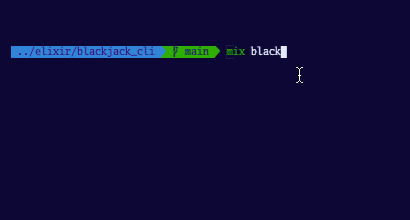Day 6 of 100 Days of Code
Today I was able to work on my Blackjack CLI written in elixir. It's starting to shape up, but it still feels a little off. Here's a quick demo:
Update to the user experience
First I took advantage of elixir's pattern matching in functions to create a set of functions to calculate the value for a given card.
defmodule Card do
...
def value(%{value: "J"}), do: 10
def value(%{value: "Q"}), do: 10
def value(%{value: "K"}), do: 10
def value(%{value: "A"}), do: 11
def value(%{value: value}), do: value
...
end
Next, I added a flash to displaying the cards by adding a white background and painting the card according to the suit.
defmodule Card do
...
def display(%{suit: suit, value: value}) do
IO.ANSI.color_background(15) <> IO.ANSI.color(color_code(suit)) <> "#{suit}#{value}" <> IO.ANSI.reset()
end
defp color_code("♥"), do: 9
defp color_code("♦"), do: 9
defp color_code("♣"), do: 0
defp color_code("♠"), do: 0
end
Another bit of flare I added was chaning out the Deck @suits constant with the unicode icons for each suit. It's the little things you know?
Now, let's take a look at the changes to the Game module.
defmodule Game do
# Added the "finished_players" attribute to the %Game struct. When a user
# finishes their turn, they will be removed from the players list and placed
# into the finished_players list.
defstruct players: [%Player{name: "player_one"}, %Player{name: "dealer"}], cards: Deck.generate(), finished_players: []
# After all users are removed from the players list, we can pattern match on
# an empty players attr and finish the game.
def play(%{players: []} = game) do
game |> inspect_table()
end
# If there are still players, the play function logic will be a little
# different, but with the pipe operator its pretty easy to follow.
def play(game) do
game
|> deal()
|> inspect_table()
|> turn()
|> play
end
# To handle a players turn, we just ask them if they want to Hit or Stay, and
# build a new game struct accordingly.
def turn(%{players: [current | players]} = game) do
IO.puts "\n#{current.name} your move."
case IO.gets("(H)it or (S)tay\n") |> String.downcase |> String.trim do
"hit" -> deal_card(game, current)
"h" -> deal_card(game, current)
"stay" -> %{game | players: players, finished_players: [current | game.finished_players]}
"s" -> %{game | players: players, finished_players: [current | game.finished_players]}
_ -> game
end
end
# Inspecting the table clears out the terminal, then displays info about for
# the current state of the game
defp inspect_table(%{players: players, finished_players: f_players} = game) do
IO.write IO.ANSI.reset() <> IO.ANSI.clear() <> IO.ANSI.home()
if length(players) == 0 do
IO.puts "Game Over."
end
for player <- f_players ++ players do
IO.puts "#{player.name}'s\n hand: #{Player.display_hand(player)} | #{player.total}"
end
game
end
end
Implement the Dealer logic
In regular Blackjack, the deal has to hit if they have less than 17. I decided to replace %Player{name: "dealer"} with a %Dealer struct. With that in place I can use pattern matching again for the Game.turn/1 function which looks a little like this:
def turn(%{players: [%Dealer{} = dealer | players]} = game) do
cond do
dealer.total >= 17 -> %{game | players: players, finished_players: [dealer | game.finished_players]}
true -> deal_card(game, dealer)
end
|> inspect_table()
|> (fn (game) ->
IO.gets("Press enter to continue.")
game
end).()
end
What's next?
If I want to finish Blackjack CLI, I would have to handle Aces. Aces can have a value of 1 or 11. This shouldn't be to hard, but might take some time. Other than that, It would be nice to choose how many decks could be played, and play to a certain percentage of the deck before regenerating the game.
I will prolly move on to the advance section of elixirschool.com, and come back to this repo later on.






Top comments (0)